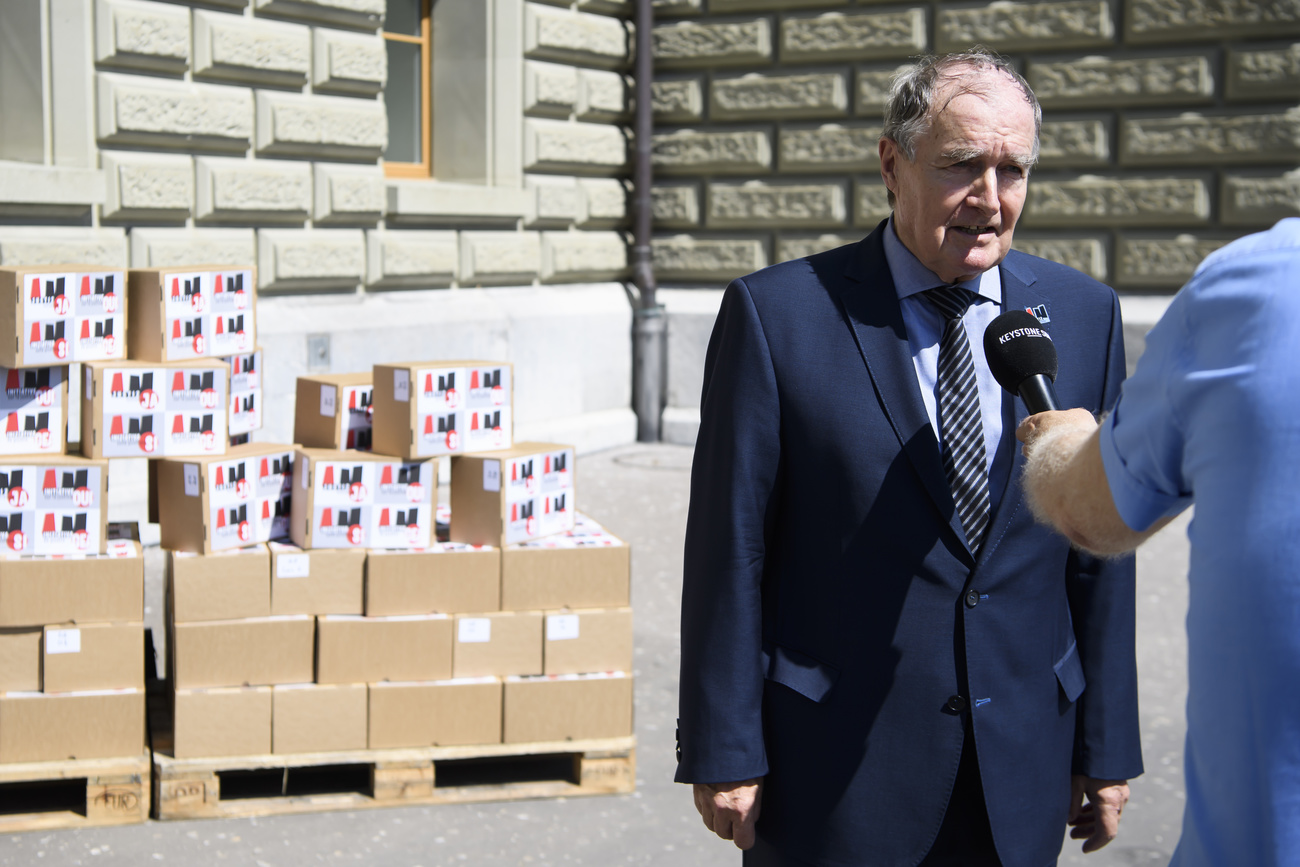
Swiss judges pay around CHF3 million in annual ‘taxes’ to political parties

In 2023, Swiss judges paid “mandate taxes” to their political parties worth almost CHF3 million ($3.4 million), according to a report by Swiss public television, RTS. Some federal judges pay up to CHF22,000 each to their party. This system, which is opaque and not based on any legal rules, is strongly criticised by the magistrates themselves, who are calling for its abolition.
It is a sort of a ritual unique to the Swiss judicial system. Federal and cantonal judges, with a few exceptions, are required to pay what are called “mandate taxes” to their party. These are sometimes fixed amounts or percentages of their salary. This tax, which has no legal basis, is considered a contribution by magistrates to the political parties of which they are members.
In Switzerland, the vast majority of judges are members of a political party. Federal and cantonal parliamentarians propose candidates for positions in the judiciary, based on a system that reflects the political weight of the parties. This tax system is widely criticised, because it can lead to suspicions about the independence of judges and political pressures.
Lack of transparency
The exact amount and payment terms of these taxes are not transparent, especially in the cantons. Based on a questionnaire sent to all local sections of the main political parties in the seven French-speaking cantons, including canton Bern, the Temps Présent current affairs programme was able to work out what judicial magistrates pay to their parties.
>>Link to Temps Présent current affairs programme on Swiss public television (in French).
In total, French-speaking judges pay between CHF500,000 and CHF660,000, all parties combined. Magistrates from the 19 Swiss-German cantons and Ticino were not questioned, but on the basis of the payments of the French-speaking judges, a range of between CHF1.3 million and CHF1.8 million can be extrapolated for these cantons. This gives a total of between CHF1.8 million and CHF2.46 million for cantonal contributions.
Swiss People’s Party receives most from federal judges
In addition, there are the contributions of 135 federal judges from the four federal courts. The figures are much more precise here, because since this year, new provisions relating to the transparency of the financing of political life require parties to declare the amounts paid by their federal magistrates to the Federal Audit Office.

More
Swiss judges want to break ties with politics
Posted online last September in a public electronic registerExternal link, the cumulative amounts paid by federal judges amount to CHF681,600. The right-wing Swiss People’s Party and its 32 federal judges head the table (CHF186,000), followed by the left-wing Social Democratic Party (CHF177,000), the left-wing Green Party (CHF163,000), the Centre Party and the Green Liberals (each around CHF64,000). The centre-right Radical-Liberal Party brings up the rear with CHF27,500.
The total amount of “mandate fees” paid by federal and cantonal judges to their political parties therefore falls within a range of CHF2,481,000 to CHF3,141,000.
Judges criticise this system
When interviewed by Temps Présent, most judges strongly criticised this party tax system. “Judges are truly independent,” says Yves Donzallaz, president of the Federal Court. “But this image, saying ‘if you want to be a judge, you pay your fee’, is extremely negative,” he believes.
Martin Burger, a former judge and former president of a court in canton Zurich, is also very critical: “We may not like to hear it, but the party tax also has a protective function. In mafia jargon, it is called pizzo. Anyone who pays the party tax continues to be supported by the party in elections and is usually re-elected. We do not really know what can happen to those who do not pay,” he explains.
+ Are Swiss judges on a tight political leash?
Marie-Pierre de Montmollin, president of the Neuchâtel Cantonal Criminal Court, who is also president of the Swiss Association of Judicial Magistrates (ASM), is concerned that judges may be suspected of paying up to advance in their careers. “These contributions do not influence the decisions we make. In concrete terms, they are two completely different things, that is clear. But people think that we are paying for our duties. And that is not good, because we say to ourselves: who are these people who are prepared to give money to have a public mission? It is not possible,” he comments.
A recent survey conducted by the ASM among its 1,300 members (935 respondents) reveals that 83% of them want to abolish this tax. Globally, the Group of States against Corruption (GRECO) regularly criticises Switzerland about this issue. This group of experts from the Council of Europe, of which Switzerland is a member, said in its latest report that this tax system poses a real risk of corruption for Swiss judges.

More
Switzerland does not satisfy anti-corruption assessment
Some politicians for, others against
Some politicians believe that the contributions paid by judges are the least they should do, especially given their high salaries: CHF170,000 on average for a cantonal judge, and between CHF220,000 and CHF360,000 for a federal judge.
Manfred Bühler, a People’s Party parliamentarian and lawyer, describes the GRECO assessments as “grotesque”. “These contributions to the parties are also a false problem because they are negligible, both in the party budget and in relation to the income of the judges. But I believe that it is a form of legitimate recognition that the judges provide annually to the party that supported them,” said Bühler.
The Greens, who collect up to CHF22,000 per federal judge elected on the party ticket, are prepared to abolish the tax, provided that another system of financing the parties is found, since the Greens refuse money from banks and lobbies.

More
Newsletters
Abolition project blocked in Geneva
Geneva minister Mauro Poggia is particularly angry about the judges’ tax. His party, the Geneva Citizens’ Movement (MCG), has put forward a cantonal bill to repeal the tax. The bill is still pending before the Geneva parliament, which has been blocked for many months. “No one wants transparency anymore,” said Poggia. “All these champions of the transparency law who systematically demand that everything be revealed at the administrative level are all absent. Left and right, it is a ‘Holy Alliance’ for omerta,” he added.
However, things are changing, very slowly, particularly in French-speaking Switzerland. In autumn 2020, all magistrates in canton Jura informed the cantonal parliament that, in order to preserve their judicial independence, they would no longer pay mandate contributions to their political party. The Association of Neuchâtel Judicial Magistrates is also asking political parties to stop soliciting contributions from judges and prosecutors. It recommends that its members no longer pay mandatory contributions.
Adapted from French by DeepL/sb

In compliance with the JTI standards
More: SWI swissinfo.ch certified by the Journalism Trust Initiative




























You can find an overview of ongoing debates with our journalists here . Please join us!
If you want to start a conversation about a topic raised in this article or want to report factual errors, email us at english@swissinfo.ch.